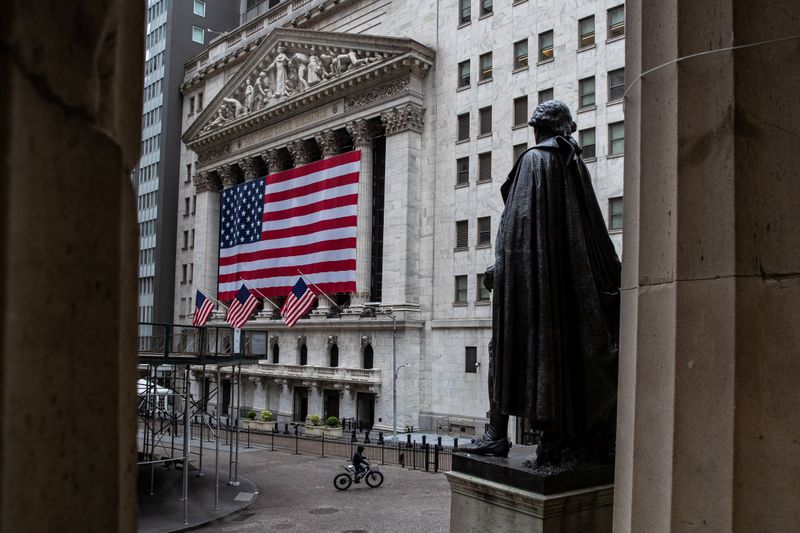By Saikat Chatterjee and Thyagaraju Adinarayan
LONDON (Reuters) - Warren Buffett's favourite holding period -- forever -- has few fans these days, with the average length of time shares spend in a portfolio hitting record lows this year as investors surf wild market swings for quick gains.
The length of time that investors hold shares has been shrinking for decades but the trend accelerated this year in volatile markets that have made people nervous about sitting on investments for too long.
There are different ways of slicing it, but Reuters calculations based on New York stock exchange data show the average holding period for U.S. shares was 5-1/2 months in June, versus 8-1/2 months at end-2019.
The previous record low of six months was hit just after the 2008 crisis. In 1999, for example, 14 months was the average.
Europe displays a similar trend, with holding periods shrinking to less than 5 months, from 7 months last December.
(GRAPHIC - Shrinking holding period of U.S. stocks: https://fingfx.thomsonreuters.com/gfx/buzz/rlgpdnajbpo/Pasted%20image%201596444244862.png)
Rob Almeida, a portfolio manager at asset manager MFS, said for years mom-and-pop punters, commission-free investing and more machine-trading have contributed to the trend.
But 0% interest rates, trillions of dollars of central bank and government stimulus and high levels of uncertainty caused by the pandemic have added to the momentum.
"Capital doesn't have a price thanks to all this stimulus," Almeida said, "The COVID-19 crisis has accelerated the trend of short-termism in investing."
Meanwhile there's little clarity on companies' future earnings, the economic outlook and the pandemic outcome.
"So what's happening is this ability to act or trade or churn, whatever you want to call it, based on information that may not be material," Almeida said.
Turnover ratios, the percentage of portfolio holdings that are replaced in a 12-month period, increased to 92% at end-June, from 85% a year ago for a group of global multi-asset funds tracked by Lipper.
The trend has ensured rich returns for nimble traders but also poses questions about market stability once stimulus fades.
(GRAPHIC - Bond returns: https://fingfx.thomsonreuters.com/gfx/mkt/azgvokagqvd/MicrosoftTeams-image%20(4).png)
'BACK TO FRONT'
Market short-termism was highlighted as far back as 2010 by Bank of England chief economist Andrew Haldane who described it as "subconscious myopia."
But buy-and-hold investors have had a rough year so far. Stocks fell 40% and bounced by the same margin in the space of three months. Around the 2008 crisis, moves of such magnitude occurred over three years.
Kevin Russell, CIO of UBS' O'Connor hedge fund, with $6.1 billion in assets under management, said his lowest turnover strategies, unable to quickly adjust hedges and exposures, are now his worst performing.
Low-turnover strategies struggle in this environment as they are not as durable against the swift rotations happening across sectors and style factors, he said, referring to different investment styles.
And when short-term returns are so attractive, it makes little sense to hold assets for longer. Returns on 10-year Treasuries in the first 2020 quarter almost matched what would mathematically accrue after a decade, BCA Research strategist Dhaval Joshi noted.
"The same principle also applies to mainstream stock markets which are priced for feeble long-term returns – yet can rally by 20-30% in the space of a few weeks," Joshi said.
"The incentive structure is back to front."
On bonds too, whether high-grade government securities or "junk" debt, average daily turnover is running 10-20% above historical averages, trading platform Marketaxess said.
Asset manager BlueBay generally churns bond positions twice a year. But that horizon shrank in March-April to 2-3 months as volatility constantly threw up buying opportunities, said portfolio manager Kaspar Hense.
The issue has implications for spending on investment research, which is often used to set out strategies for longer-term investing, as well as for long-term pension and insurance investors. And BCA's Joshi said short-term players buying and selling at the same time can extinguish market liquidity, increasing volatility.
In terms of real-world impact, it is a poor incentive for long-term corporate planning, Fabio Di Giansante, Amundi's head of large cap equities, said.
"Because what ultimately drives share price performance is earnings and you need to hold on to good investments for a while to see (companies) execute their business decisions," he said.
(GRAPHIC - US stock valuations and Fed Balance sheet: https://fingfx.thomsonreuters.com/gfx/mkt/xlbpgbzjdvq/US%20stock%20valuations%20and%20Fed%20Balance%20sheet.JPG)
